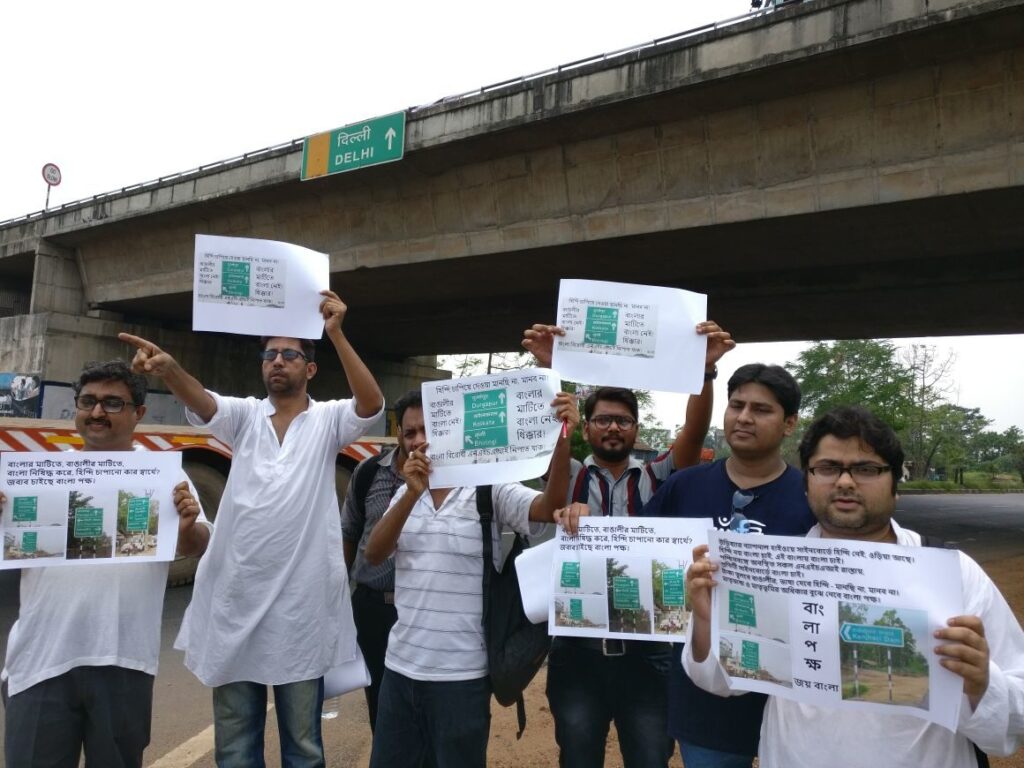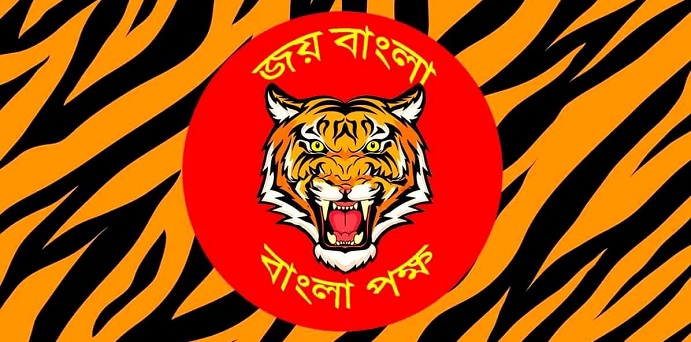The Bangla Pokkho is a fast-growing nationalist movement in West Bengal organized along linguistic lines and aimed at protecting the ‘Bengali Jaati’. With the BJP’s active provocation along Nationalist Hindu ideas and its promotion of a Nationalist identity, many reactionary forces and groups have formed all over India, and in West Bengal. One such group is Bangla Pokkho, a group that frames its stance along linguistic lines, claiming to fight against “Hindi Imperialism”, the threat to the “bengali identity”, as well as the federal structure of power distribution.
Bangla Pokkho- The Organisation
Bangla Pokkho, formed in 2017, call themselves a “non-communal, apolitical and non-profit organisation”, working for the rights of “Bengali language and Bengalis”. Their demands include:
- 85% reservation for residents of West Bengal or people voting for the state in fields like job sectors, education, military, administration work
- Usage of Bengali language in all state and national level exams, forms, documents
- Reservation of 85% for students of the state board examination in state universities
- Hiring only candidates who cleared state level exams for state government administration positions instead of the national level examinations like IAS.
- The Bengali language getting equal status like that of Hindi constitutionally
- and many more.

Their demands are weaved around pushing the Bengali language for domination, as well as preserving a “Bangali Jaati”, an identity of which is formulated around the Bangla language itself. The kind of narrative that Bangla Pokkho prescribes is that Bangla, the Bengali people, and Bengali culture are at risk of being overrun by the imposition of Hindi and Hindustani culture. While they have been called a front of the Trinamool Party, and have definitely shown opposition towards the BJP Party in Bengal, one of their spokespersons states in an interview with The Telegraph, “We are not anti-BJP, it is the BJP that is being anti-Bengali by promoting Hindi Hindu Hindustan. We are against that ideology”. Hence, the emphasis is strongly put upon the Bengali Language and a certain claim to indigeneity by virtue of having spoken that language or prescribing to the cultural icons that are popularly marked as “Bengali Culture”.
In the same interview with the Telegraph, the spokesperson talks about how the language divide is a problem of “class”, and imposition of Hindi would mean people who can read only Bengali are deemed illiterate. Furthermore, he talks about how the organisation operates (by going village to village to make the people “aware” of their rights “as Bengalis”). He even states that they are very “liberal”, so much so that they were at that time thinking to open a front for the non-Bengali speakers. Another spokesperson further adds that “We want equal rights for Santhali, Rajbangshi, everyone” and that “We support any language which has roots in Bengal.
On the ground, they talk about promoting the “culture of Bengal” with festivals like Durga Puja, Kali Puja etc, or literature written by the likes of Tagore, Bankim Chandra Chattopadhyay and more, or promoting foods thought to be part of the Bengali cuisine. On the side of the things they oppose happen to be Hindu festivals that are more popularly celebrated outside west Bengal, with a special hatred towards the “Biharis”. The things they do promote are what are loosely considered in popular culture as signifiers of a Bengali culture.
The Glaring Problems
The problems that arise with this narrative and Bangla Pokkho itself are many. To start with, this narrative ignores many of the core realities of Bengal.
Where is caste in all of this? Where are the non-hindu groups in this narrative? Where are the Adivasi populations and their language and culture in all this? What about the people of the Northern part of West Bengal and their culture? The imposition of Bengali culture that has long been resisted by groups such as the Gorkhas? The culture promoted here as “Bengali” culture is very distinctly that of the Hindu Upper-Caste. While loose statements of solidarity to other groups are made by the organisation, it only extends as long as the other groups are ready to accept the upper-caste cultural symbols. The harm the culture of the hegemonic upper-caste has done to these other residing populations of West Bengal which can make claims to indigeneity or nativity, are not acknowledged.
The extreme xenophobic hatred towards Hindustani people, especially towards the people of Bihar is alarming. On the Bangla Pokkho YouTube channel, one can find videos of Bihari people being harassed by Bengali mobs (like asking a man who cursed at a bengali man to do sit-ups). People of Bihar even equated to dirt. But most of the people who migrate towards West Bengal happen to be poor Bahujans in need of work. These people are in no position to be a threat to the “Bengali Culture” that Bangla Pokkho seems to promote.
Even among groups that speak Bengali, not all can make a claim to victimhood to threats to their identity. The Bangla Pokkho claims to fight for all Bengalis, even that of Assam. However the problem that Assamese Bengali population face by virtue of being mostly Muslim, Bahujan, and migrants from Bangladesh, is not comparable to someone not getting a holiday during Kali puja. The culture that the Bangla Pokkho promotes already belongs to those who form the dominant group of Bengal, and the promotion of such nationalism threatens to create a similar situation in West Bengal for supposed ‘outsiders’ that has led to the persecution of Bengali Muslims in Assam.
If the government is to truly grant the 85% reservation, that the Bangla Pokkho has been campaigning for, then those seats will eventually be filled up by upper-caste Bengalis. A productive demand instead could have been for more seats in Universities and more job opportunities for all.
There cannot be any unifying identity formed upon claims of persecution that do not uniformly apply to all that are included in that identity.
Linguistic Chauvinism and Nationalism
Most definitely, there is a need to oppose the Nationalism and fascism that has got India in its grip. However the answer to that cannot be to form identities that operate in a similar manner. Like all forms of Nationalist identity building, a single identity cannot be formulated without an “other” to pit against it. The “other” is the outsider. Here, it is the Hindi speaking Hindustani (mostly the Biharis), who threaten the fabric of the apparent united Bengalihood. That is the very thread that stitches together this “bangali Jaati”, because there was no unified “Bangali Jaati” to start with.
This trend is similar to the other forms of chauvinistic political groups in India, like the Shiv Sena (Bangla Pokkho claims to be not like them, but the similarity cannot be denied), or the Linguistic Chauvinism that has been gaining traction in Karnataka. Unlike the Shiv Sena, Bangla Pokkho does not have such power in the state yet. This might only be by virtue of it being a new organisation.
The Root of the Problem
A failing economy has been a problem in West Bengal for a long time now. However, the rapid fall of the economy under the rule of the BJP, and the growing support towards BJP in many parts of Bengal, has now affected the Upper Caste and middle class groups as well, leading to increasing panic. If one looks at the rate of unemployment in West Bengal as of 2017-18, on paper, the rates might be lower than that of the rest of the country. However, 32% of those employed were working as a part of the casual labour force while among the salaried jobs, 59% did not have any social security. However, the biggest burden will still be on the shoulders of those who were already suffering from before.
This kind of movement and ideology can easily be hijacked by the BJP. Moreover, the actual issues would still not be solved. All it would help with is preserving the previous status quo, rather than actually causing any improvement in employment and the economy as such. This kind of subnationalist articulation cannot fight the fascist nationalist communal forces at the centre.
In Conclusion
A different, more nuanced, movement is needed to be of any effect upon the actual threats that people of West Bengal or persecuted Bengalis may face. That movement cannot come from the Upper Caste Hindu dominant groups, and would have to have at the forefront people from the communities and groups that are actually threatened (and have been so for a long time). No such claim of a united identity and nativity can be made solely on the basis of the Bengali language. Resistance is definitely needed. but the Hindu Raj is not merely an issue of Hindi Versus Bengali, but that of upper-caste Hindu domination. What is being promoted by the likes of Bangla Pokkho is just another, more “liberal” Hindu domination under the garb of fighting for a fictional “Bangali Jaati”.
Shinjini Moitra is a recent graduate from Presidency University about to pursue her Masters in Sociology.



